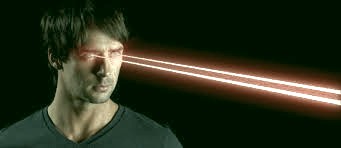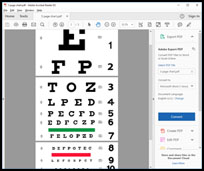When I first started to tentatively explore the world of natural vision improvement, hardly daring to hope that this would help with my strong myopia, I came face to face with the realization that I often didn’t want to look at what was in front of me. Occasionally I was bored, like when the lessons in school were too easy, so I preferred to daydream, my mind’s eye on my mental images. Sometimes I was afraid or overwhelmed, when I would take a quick glance and examine that snapshot in my mind, rather than staying visually connected to my environment.

When I thought I had to see everything and understand it all, it was too much for me to do and I felt inadequate. My strategy was to take a little piece at a time to digest, then move on to the next piece. When I was faced with too many details clamoring for my attention at once, it was a recipe for anxiety. Dr. Bates wrote extensively about central fixation, or what some modern teachers call central clarity, seeing best only the direct area of focus, with everything around it in the periphery less clear, though still visible.
Thinking about this further, “central fixation of the mind”, or giving attention fully to just one task at a time, then moving on to another task which occupies my focus, is the most productive. The healthy eye works this way too, and very quickly, dancing from one detail to another to paint a more and more complete picture of the scene before us inside our brain. I’ve realized I do this naturally when I’m remembering an incident, mentally scanning over the scene to pick up more detail to give myself a fuller picture, and I also do the same thing when reviewing my dreams. So why do I have such a hard time with this noticing process when my eyes are open?

My theory now is that the trouble is not physical, that there’s nothing organic wrong with my eyes’ anatomy or functioning, nor with my visual brain. My physical open-eyed vision has slowly improved over the years, especially from the emotional work I’ve done to release my high anxiety. And yet it is much easier for me to get overwhelmed when my eyes are open, when the view often seems like too much to handle. This can make me nervous, and then I can’t see as well.
The way I cope when this starts to happen is simple: slow down (I have a bad habit of rushing when I get nervous), breathe slowly and deeply, and maybe do some EFT or “tapping” to calm and center myself. Most of the sensory input which rattles me is not a true crisis, like a sudden siren blaring near me, though my nervous system can react like it’s a disaster, so I need to remind my body that I’m safe. Once I can come down from that highly stressed state, I can see and think much more clearly. Maybe I misinterpreted that frightening image I saw, and it’s not a problem at all.
Those of us prone to nervousness who also have vision difficulties may need emotional stability before we can see well consistently. Memory of past visual successes can help too, like the time we negotiated that long drive in the pouring rain, or other challenging visual conditions we dealt with calmly and efficiently. When I walk at nighttime or in the dense fog, I appreciate the cool dampness nourishing my eyes. I can go as slowly as I need to, and enjoy all I’m seeing in the dim light.

Looking curiously in an interested way, scanning over the scene to pick up more details, left and right, up and down, near and far, is how to see better and more clearly. It sounds obvious, but if you don’t really look, you won’t see much! Every view, indoors or out, has something fascinating to see. Look for what will delight your sight. Appreciate that, and your miraculous powers of vision.
I wore strong glasses, then contact lenses, from age 5 into my 40s. While making many mistakes, eventually l learned how to improve the way I use my eyes and to see in a more relaxed, healthy manner. It is my pleasure to coach others to do the same. Visit me at https://NancyLNeff.com.


What a lovely post, Nancy, it brought me relaxation and some peace just reading it. I’ve been like you’ve been, wanting to see or understand all at once, and it is so bad and self-defeating. It’s like trying to learn a new language or a musical instrument in a few days, and when we can’t we get frustrated and think we’re not up to it and there beings the downward spiral. Bates once said (“A Study of Imagination”) that, regarding someone he treated, that “The great difficulty this patient had was that he desired to remember too much at once or he desired to imagine more than two things at once. It always spoils the mental pictures when one tries to remember too much at once.” We need to take time, enjoy and we both know this. Thanks so much for this, your lovely new post, and may 2024 be a great year for your vision improvement, and for mine!
Hi Darrel, and happy 2024 to you too! Thanks for the reminder of Dr. Bates’ words. What a wise man he was! I shoveled a lot of snow today, and deliberately put myself in that “one shovel-full at a time” mindset to get it done enjoyably. So many people are fighting Reality, resisting what’s in front of them (and their eyes) instead of welcoming it and dealing with it. Life is to be savored, not pushed away! May your coming year be fulfilling, bringing you the growth and learning you hope for.